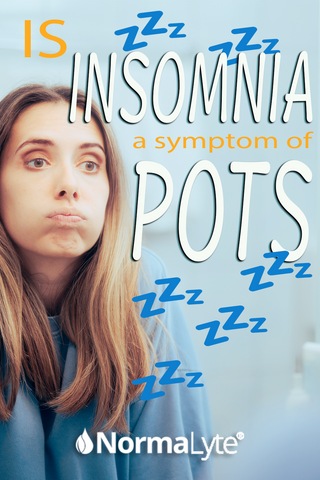Is Insomnia a Symptom of POTS?


Sleep is maybe my favorite thing. Like, ever. I love to sleep. But going to sleep? It seems impossible sometimes. I lay there with my eyes closed, body super still, and time seems to drag on forever. I open my eyes and find that a couple hours have passed. Insomnia.
Connection between POTS and insomnia
Postural orthostatic tachycardia syndrome (POTS) is a chronic condition that affects the autonomic nervous system, which controls involuntary bodily functions such as heart rate and blood pressure. People with POTS experience an abnormally large increase in heart rate when they stand up from a sitting or lying position. This can cause a variety of symptoms, including lightheadedness, dizziness, fatigue, and shortness of breath.
There are a multitude of different comorbidities of POTS that can make the chronic illness diagnosis even more difficult.
Insomnia is a common sleep disorder that is characterized by difficulty falling asleep, staying asleep, or waking up too early and not being able to get back to sleep. Insomnia can be caused by a variety of factors, including stress, anxiety, depression, medical conditions, and medications.
There is a strong connection between POTS and insomnia. Studies have shown that up to 63% of people with POTS experience insomnia symptoms. The cause is not really known, but there are a lot of ideas as to why this is occuring in the POTS community.
Some say that it's heart palpitations that are keeping them awake, but the fact remains that we just aren't sure why. Here's some ideas that have been tossed around in recent years:
- Autonomic dysregulation: The autonomic nervous system plays a key role in sleep regulation. People with POTS have autonomic dysregulation, which can disrupt their sleep patterns.
- Pain: Many people with POTS experience chronic pain, which can make it difficult to fall and stay asleep.
- Nausea and vomiting: Some people with POTS experience nausea and vomiting, which can also interfere with sleep.
- Anxiety and depression: Anxiety and depression are common comorbidities of POTS. Both of these conditions can also contribute to insomnia.
How to improve sleep with POTS
If you have POTS and are experiencing insomnia, there are a number of things you can do to improve your sleep:
- Establish a regular sleep schedule and stick to it as much as possible, even on weekends.
- Create a relaxing bedtime routine. This may include taking a warm bath, reading a book, or listening to calming music.
- Make sure your bedroom is dark, quiet, and cool.
- Avoid caffeine and alcohol before bed.
- Get regular exercise, but avoid exercising too close to bedtime.
If you are struggling to improve your sleep on your own, talk to your doctor. They may be able to recommend additional strategies or medications to help you get a better night's sleep.
Conclusion
Insomnia is a common and debilitating symptom of POTS. There are a number of things that people with POTS can do to improve their sleep, such as establishing a regular sleep schedule, creating a relaxing bedtime routine, and avoiding caffeine and alcohol before bed. If you are struggling to improve your sleep on your own, talk to your doctor.








Leave a comment